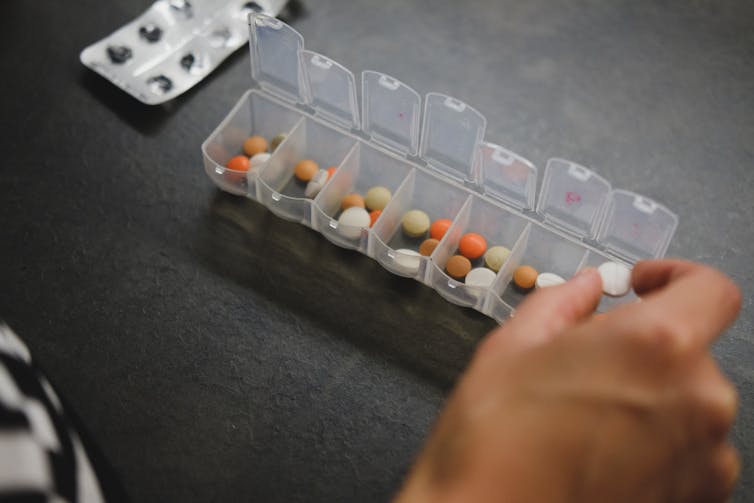Here’s what new 60-day prescriptions mean for you and your hip pocket
Share
From today, there are significant changes to how some common medicines are prescribed and dispensed in Australia. This means you could walk away from the pharmacy with 60-days’ worth of your usual medicine from a single prescription.
Until now, most long-term medicines were only available for 30 days at a time. So the price of these medicines for some patients may effectively halve.
You would also need fewer trips to the GP for a prescription and fewer visits to the pharmacy to have your medicine dispensed.
But not all medicines are yet eligible for 60-day scripts and not everyone is prescribed 60-days’ worth of medicine at a time. Here’s what the changes mean for you.
Can I get a 60-day script today?
If you have a current prescription, you need to use this prescription first before you get a new one. To be eligible for a prescription that provides medicine for 60 days your medication needs to be on the approved list.
Your doctor also needs to assess if you are stable on it. This is to avoid wastage. We know new treatments can result in frequent changes to medication regimens, which would result in wasted medicines if they don’t end up being used.
Your doctor may also give you “repeat” prescriptions for 60-days’ worth of medicines at a time. Under the new rules, this could mean up to 12 months’ supply of medicine (the initial script plus five “repeats”). You would have to pay for each of these repeat scripts when your medicine is dispensed every 60 days.
Is my medicine on the list?
The roll-out of 60-day scripts will be in three stages. The first stage, which begins today, includes medicines for cardiovascular disease (such as heart disease and stroke), heart failure, high cholesterol, gout, osteoporosis, and the gut conditions Crohn’s disease and ulcerative colitis.
This includes some of the most common medicines prescribed in Australia, such as atorvastatin for lowering cholesterol, and perindopril for lowering blood pressure.

Laurynas Mereckas/Unsplash
The following stages, set to be rolled out over the coming 12 months, include medicines for diabetes, epilepsy, glaucoma, asthma and Parkinson’s disease.
When fully implemented, these changes will affect more than 300 prescription medicines available on the Pharmaceutical Benefits Scheme (PBS).
These medicines have been chosen because they are appropriate treatments for people living with stable, chronic health conditions, they meet clinical safety criteria, and are considered cost-effective.
Medicines not available for 60-day dispensing are those only for short-term use and medicines known to be at risk of overuse. These include pain medicines and some medicines for mental healthcare conditions.
Will I save money?
The government has brought in these changes mainly to try to make medicines more affordable. We know people do not seek medical care or fill prescriptions due to cost.
The maximum price you pay at the pharmacy for a PBS script (known as the co-payment) is not changing. It’s still A$7.30 for concession card holders and $30 for non-concession card holders. But by having 60-day dispensing, you’ll only be charged this every two months instead of every month.
But not everyone will save money from a 60-day prescription because in some cases your pharmacy may already be discounting your medicine. If the price for 60-days’ supply would not take the price over $30, you may not be getting two scripts for the price of one.
For example, a commonly discounted medicine is atorvastatin. In Australia, a non-concession patient generally pays between $8 and $22 for 30-days’ supply. But it’s likely that a 60-day supply would cost between $15 and $30.
The amount you or your family need to pay to reach the PBS safety net is also not changing. This is the threshold you need to reach before medicines become free (for concession card holders) or discounted (non-concession card holders) for the rest of the calendar year. In some instances, 60-day dispensing may result in you or your family reaching the safety net threshold later, or not at all.

Shutterstock
How should I store my medicine?
If you don’t store your medicines correctly at home they can become degraded and not work so well. With a 60-day supply, correct storage is even more important.
As a general rule of thumb, never store your medicines in hot rooms or your car (even in winter) and don’t store them in direct sunlight. If your medicine needs to be stored in the fridge, your pharmacist will let you know.
One example is latanoprost, which are drops for the eye condition glaucoma. You can keep the bottle you are using in the cupboard but you need to store the unopened, second bottle in the fridge.
In a nutshell
Remember, 60-day dispensing is only available for new prescriptions. When you next see your doctor, if your condition is stable and your medicine is suitable, you will be provided a 60-day script. Your pharmacist will then dispense a 60-day supply.
If you have any questions about the new rules, ask your local pharmacist. Information is also available from the Commonwealth health department and the Consumers Health Forum.![]()
Andrew Bartlett, Associate Lecturer Pharmacy Practice, University of Sydney and Nial Wheate, Associate Professor of the Sydney Pharmacy School, University of Sydney
This article is republished from The Conversation under a Creative Commons license. Read the original article.




